13 Free Tools and Dark Ways for Your Content SEO
SEO content writing is the best free method for your blog or website's visibility. User manipulation tactics and free SEO tools that will take your SEO to the edge.

#13 Build a Swipe File for Inspiration
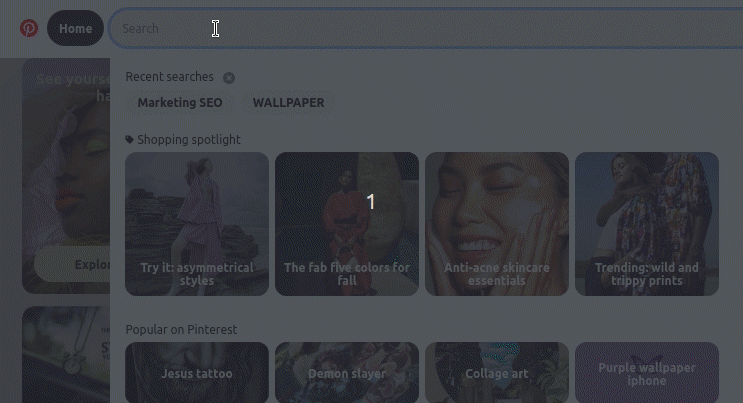
A swipe file is a folder you keep for inspiration and to remember the work of others in the future. When writing an SEO article from scratch, you don't have to think about what to write from scratch. Instead, if you keep the popular posts of people who have dealt with similar topics on the internet similarly, if you save them somewhere, instead of writing the article from scratch, you will write the article with a guide in mind thanks to the swipe file. If you are too lazy to keep a swipe file, you should definitely take a look at the website below. You can access swipe files in many categories from that website. I also use Pinterest as a swipe file tool. I suggest you actively use Pinterest both for creating your own swipe file and as a ready-to-use swipe file.
#12 Focus on the Demand, Not Just the Facts
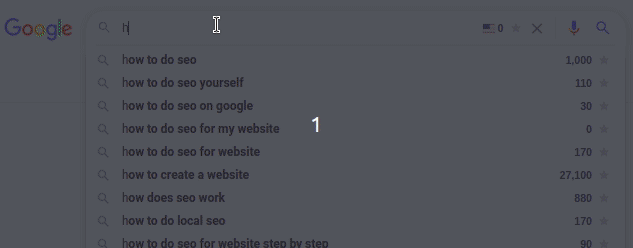
In search engine optimization, not only the keywords but also the search intent (click-through rate) determines your ranking in the search engine. That's why you should never hesitate to tell the reader what you promise in the title, intro, and meta description. After all, users want to find what they are looking for, no matter how many search engine optimization strategies your competitors apply, If you write what you are promising with your content to your title, intro, and meta description, your post will stand out more than others in search results. Also, including numbers (especially odd numbers) in the title, intro, and meta description will make your content more consumable and stand out in search engines.
Example: Consider two titles. "Professional Writing in 3 Topics" and "3 Key Points That Make You a Better Writer". Which one?
#11 You are Looking for Yourself
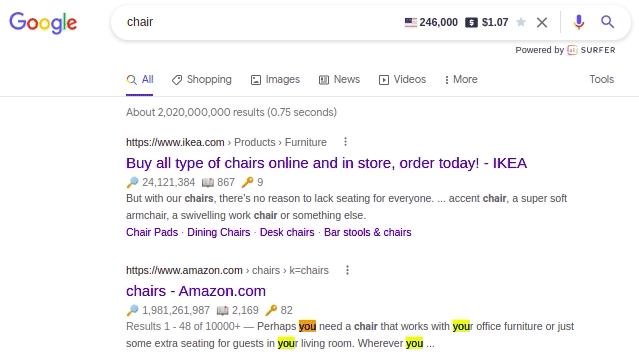
If you want to be good at SEO writing, you must understand human psychology and its marketing use. People prefer to direct their attention to things that are relevant to or dedicate to them first. If there is a text that appeals to you, you look at that text first. If there is content that you are in, you look at it first. Even if you see the qualifications and situations you have, this is the first thing that draws your attention.
In short, "you" draw your attention the most on the web, while searching for pages. This is the biggest bug in human psychology used for marketing and SEO. As a matter of fact, you should not hesitate to write "you", "your", "yourself" and "yours" (or user-targeted qualifications and situations), especially in the title, intro, and meta description while creating SEO content. Thus, users will be inclined to focus on the articles on your site among so many results in the search engine.
Example: Imagine watching a birthday video you shot with your friends. Who do you look up to the most?
#10 Word Selection and Word Alternatives
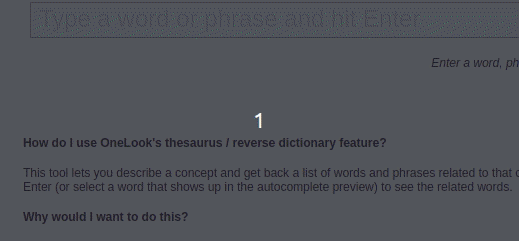
You have determined the necessary keywords for your article, but you cannot find a place to put the keywords. That's where the OneLook Thesaurus tool below comes into play. Thanks to Thesaurus, you can see the synonyms and alternatives of any word. From these words, you can choose the ones that are suitable for SEO or the ones you like and use them. Another important difference of OneLook Thesaurus is that it also performs a reverse dictionary lookup with what you type. In this way, you can define anything with your own words and find the word or phrase related to that concept. I usually use this feature to derive a topic from the main topic in my mind.
Example: If a pet shop owner wants to write an SEO article about cats, he can think of a cat-related topic by typing "cat" on OneLook Thesaurus and getting help from the terms that come up.
#9 Main Keyword Should Be Neither Generic Nor Specific
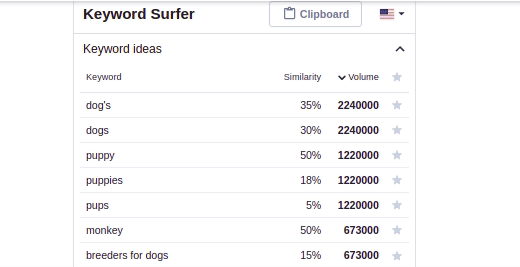
As your main keyword phrase gets longer and clearer, the competition decreases, but so does the demand, making it easier to rise in search engine rankings. As your main keyword phrase becomes shorter and more generalized, the competition increases, but the demand also increases, and it becomes very difficult to rise in the search engine rankings. If you don't want to lose your potential profit or the potential popularity of your content, you should remember the search engine authority of your site and create your content on a suitable main keyword in the middle of this range. You should choose a medium growing demand and medium competition keyword phrase. In any case, if your content achieves a strong success in the lane it is in, it will begin to dominate general keywords too. You can use the keyword research tools to extend the main keyword phrase to the appropriate demand and competition.
Example: Is it possible to rank on the first page of the search for "cats"? What about "cat vomit"? What about "my cat is throwing up"? What about "my cat is constantly throwing up feathers"? Of course, the most logical keyword phrase here would be "my cat is throwing up", which is both not so hard and average hit.
(By the way, most of the cat-related stuff has been taken over by powerful sites :) )
#8 Answering Questions On The Topic
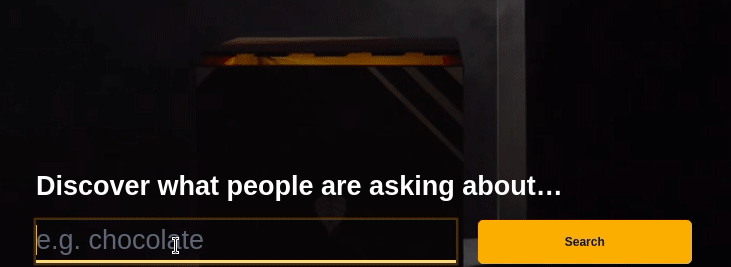
Don't you wonder what your target audience asks the search engine about the topic in your mind? What phrases does your target audience use related to the topic? What are they uncomfortable with and what do they like about the topic? Data from search engines are great for getting to know your audience and producing content that appeals more to them. This tool below is a web application that filters, interprets, and categorizes data from search engines based on your content topic. With this tool, you can get to know your audience better by looking at their questions and the phrases they use. With this tool, you can access dozens of tips on what to write about your article topic and the search intent of your target traffic. Also, knowing what questions and problems to focus on in articles and pages makes a big difference in terms of search engine optimization and generally makes your website or blog stand out from other sites and blogs on the internet.
Example: If you are writing an article about artificial intelligence, knowing the questions people ask about artificial intelligence and the phrases used will both make it easier for you to write and help you stand out on Google.
#7 Keyword Research for Relevant Searched Keywords
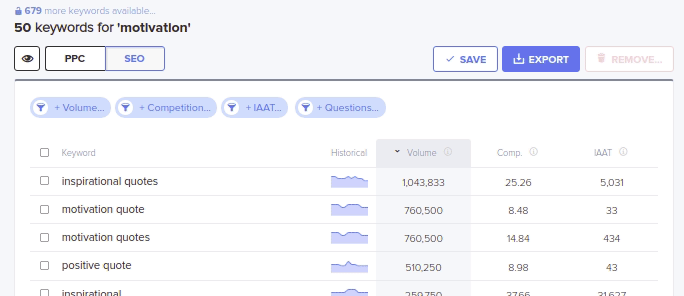
When it comes to SEO content writing, the most important point is keywords. Keywords not only help you reach your audience but also give the most important clue about what your article content is and what your site (or blog) is about to the search engines (Google as an example).
- Including keywords that you will discover with the tools which we list below, on your page or blog post.
- Searching for these keywords in search engines, examining the content in the links with high Google ranking.
- Observing your target users in social media such as Twitter and Facebook.
This process is the standard routine that should repeat before starting an article in SEO writing. It may sound tedious, but it's worth it. It also gets significantly easier once you get used to it. Also, don't forget to note the volume, cost per click, and difficulty of the keywords you decide to use during your keyword research.
Example: If you are going to write a blog post about your trip to Paris, you should find and use the phrases searched in search engines such as travel to Paris, Paris trip, tour to Eiffel, search the keywords in the search engine, examine your competitors both in search and on social media, for your blog post to reach the largest possible audience, If necessary, you should imitate your competitors and share your post on social media even if no one will see it.
My favorite tool is the Keyword Surfer extension for Chrome. With this extension, you can see the monthly volume of the keywords searched, the money paid by the advertisers per click, the monthly traffic of the sites in the results, the words, and keywords suitable for the search result used in the results directly in the Google search results. There's even a search engine optimization-focused text editor that counts how many times these keywords are used.
Useful Free Tools For Keyword Research:
#6 Headline Selection and Importance for SEO Copywriting
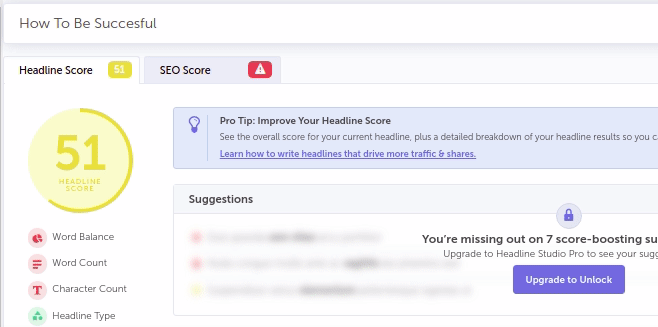
If you want to write SEO content better, you should never skip the SEO of the headline. As an SEO copywriter, my job is not only to create SEO content for better search engine rankings but also to generate user intention based on the common interests of the target audience. So you cannot think of SEO alone without marketing techniques. Normally, it is almost enough to find the keywords searched in the title for the search engine, but when we consider the click-through rate of the title in search engines (an important criterion for Google), we should also work with the title. So we can create a strong user intent to click. Headlines with a high tendency to click are called clickbait. The tools below are wonderful free tools for creating strong clickbait headlines. By looking at the headline score in the tool and by trial and error you can find a headline that is both eye-catching and beautiful.
Example: Imagine that you have prepared a nice article about the tail movements of dogs and you need to decide on a headline. For this headline to provide both SEO and user interest, you may normally have to think for a long time and try to predict user behavior, but still, you may not succeed. Instead, if you register and write the headline in your mind to Headline Studio, you can see the SEO and user interest value of your headline as a clear score in numbers.
#5 Attention Bait is "Free"
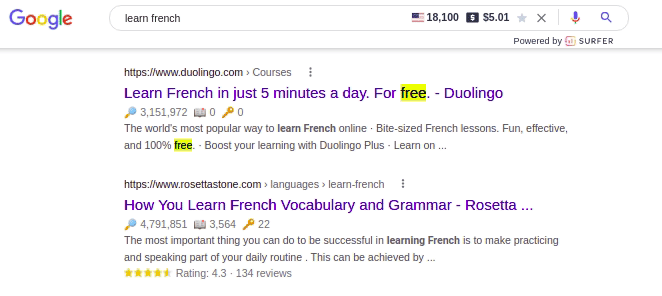
Your subconscious mind is constantly trying to measure the cost (in both effort and money) of everything you see and produce profitable actions, even if you don't realize it. When you look at a page, this circuit running in your head continues to measure the values on the page. If it senses something on the page that costs less (in terms of effort or money), it will shift your focus in that direction. Thus, if you use words that indicate low cost such as "free", "costless", "easy", "fast" or "discount" (or reject the effort and expense) in SEO writing, especially in the title, intro, or meta description, the focus of the user will shift to your pages, articles or blog post when searching the internet among the links or blogs.
Example: Imagine that you are looking for a job opportunity to earn money from home on the Internet. All of a sudden, as a result of a search, you saw that it says "5 Fastest Ways to Earn Money without Cost". Can you resist?
#4 "Because" It is The Shortcut in the Mind
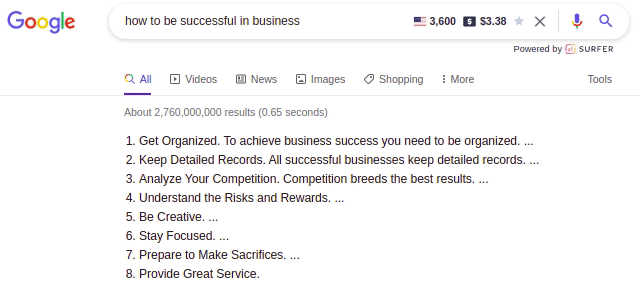
When many people write SEO content, they stack too many keywords and never give the user what they want. In such a case, although Google disqualifies other sites on the web that have similar content and did not use keywords efficiently in the ranking of search results due to keywords, especially in the competition for the first search page, the click-through rate, the time the user stays on your site and the consumability of your content is much more important. How well you give the user what they want determines the consumability of your content and how long the user spends time on your content. This allows your article or blog post to rank higher in search results relevant to your content because the minds of users are constantly looking for shortcuts for the results. Therefore, in SEO content writing, do not forget to use the words "because", "so" or "therefore" (or simply reasons) to present to the reader what they are looking for.
Example: Imagine that you have an accident and you are searching the internet for an accident lawyer. You click on the links one by one and look for a good lawyer on the Internet. The introduction to one article states, "You should definitely hire a lawyer who has experience with insurance companies for car accidents because..." Wouldn't you be interested?
#3 "Disrupt" the Expectations of Users
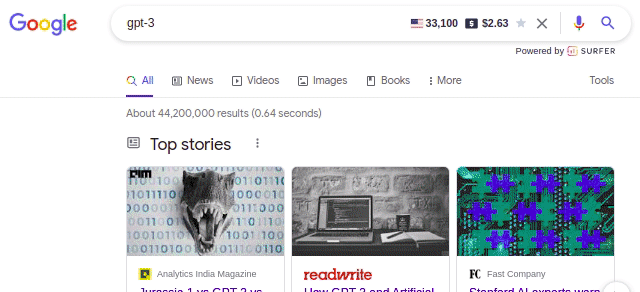
When people see an unexpected negative phenomenon, their minds perceive it as a threat and make it the center of focus. A small analog of this motive also works in search results. If you use negative but powerful words such as "disrupt", "stumble", "mistake" or "destroy" (or astonishing words) in SEO content writing, you destroy users' search intent and start a process in their minds that will draw their attention to your content. As always, these words are most effective in the title, intro, and meta description.
Example: Imagine you are searching for a good strategy game on the internet. Among the search results, a search result's description says, "This newly released game destroyed the market with its launch.". Is it familiar?
#2 "Ultimate" Way is to Promise Best
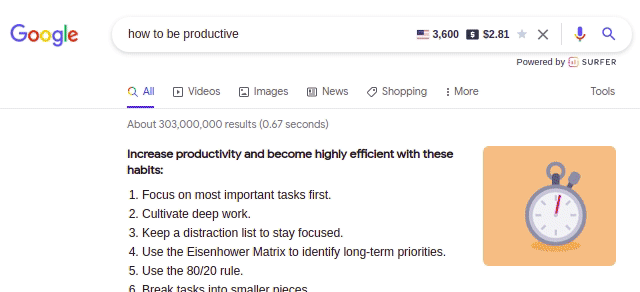
Users love the promises they come across during their search. Search results that promise something always attract more attention. Among the promising search results, those promising the best, the shortest, the easiest, the most detailed, or the most accurate stand out. Therefore, if you use the words "ultimate", "final", "best", "favorite", "guide", "easiest", "step by step", "top", "insane", "unique", "essential" and "most" (or just exaggerate to the top) in the title, intro, and meta description of your content, your content will be preferred more in search results.
Important: Making false promises to users angers users and is unethical.
Example: Imagine that an ordinary person, who does not like to search for things on the Internet, searches for a company on the Internet to get insurance. When he comes across dozens of search results, does he look at it one by one and try to find the best one, or does he click on the post titled "US's 3 Favorite Insurance Firms"? Thus, this post in the 7th rank rises to the 1st rank in a short time in the search engine.
#1 "Imagine" Your Content Ranking First

Feels good, right? Readers and search engine users will feel it too, which is what makes it a powerful search engine optimization and marketing tactic. When the human brain imagines doing something, it fires signals from neurons and releases hormones as if it were actually experiencing it. Moreover, the human brain is more inclined to do something it has done before. Sales firms use this tactic very well and want users to imagine that they are happy when they buy the product. This makes it much easier for users to purchase the product. Similarly, if you invite people in your content to imagine and feel good, it will make people develop stronger attention and attachment to the content. Users who spend a long time on your content give search engines the impression that your content is valuable. If you provide a lot of experience for the user to imagine, users will also develop loyalty to your site itself after a while. So if you use the words "imagine", "feel", "dream" and "experience" (or just trigger readers' minds and emotions) in the title, intro, or meta description along with nice stories, you will allow your users to generate stronger interest in the content and develop loyalty to your site.
Example: In their ice cream advertisements, some companies use close-ups of beautiful models eating ice cream to make the viewer imagine they are eating ice cream, while simultaneously featuring words related to pleasure and happiness, and of course pleasant music. Although we do not do video editing, very good marketing implications can be made from ad videos.
Examples of imagination usage are also frequently encountered in articles on the Internet.
Example: Imagine you are an environmentalist researching the reduction of turtle spawning grounds on the Internet. You look at the search results on a search engine and the description of a search result says, "Imagine you become a Caretta caretta about to lay an egg in the Mediterranean. Let's see how few options you have.". Naturally, when you read this explanation, a story started in your mind that did not start in other search results, and you immediately developed curiosity and commitment to that result. Most likely, that search result will not only earn your clicks but will also hold your attention for a long time and prove to Google that it is good content.
In this article post, Gofth gofther Gofther examines the concepts of content writing, title intro, intro and meta, meta description, keyword research, keywords, article and results. Check out other recommended posts for more education & how-to article content focused on seo.






























